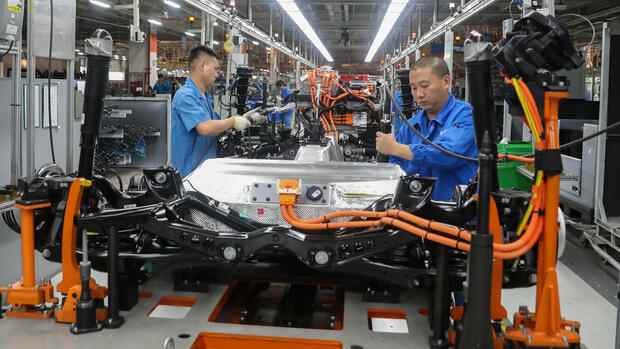Berlin German politicians are concerned about the extent of the Communist Party’s (KP) influence on the German economy in China. As the Handelsblatt reported on Tuesday, the KP is increasingly exerting a direct influence on the business of German companies in China through its members and so-called party cells.
“The establishment of party cells is not new, but apparently the effects have reached a new, worrying level,” said Johannes Vogel, first parliamentary director of the FDP parliamentary group. “After the KP officially reduced the joint venture requirement, the Communist Party apparently simply changed the lever of influence,” said the FDP deputy. The party cells are the more subtle and therefore potentially more dangerous way.
As can be seen from company documents and insider information available to the Handelsblatt, KP party members in China are involved in decisions on location issues, business models and personal details in at least one plant of a group that is listed in the leading German index Dax.
There is a risk of a similar development in other local German companies. For several years now, companies in China where three or more party members work have been required to set up an official Communist Party representative. In 2017, according to state information, 70 percent of foreign companies already had such a KP facility. There are no more recent figures.
Top jobs of the day
Find the best jobs now and
be notified by email.
“It has already become apparent in recent years that the influence of the Communist Party and the Chinese state on companies in China is growing,” said Nils Schmid, foreign policy spokesman for the SPD parliamentary group. One must expect this influence to become stronger. “Companies have to think carefully about how much they want to invest in such an environment.”
>> Read here: The Loss of Control – How the Communist Party is expanding its influence in German corporations
The attempted influence is another example of how in China the lack of freedom from the sphere of politics is increasingly being transferred to the sphere of business and property rights are being eroded as a result, FDP politician Vogel warned.
Request to Chancellor Scholz
Chancellor Olaf Scholz (SPD), who is meeting head of state and party leader Xi Jinping and Prime Minister Li Keqiang in Beijing on Friday, called on Vogel to clearly address economic policy interests such as this issue alongside pressing human rights issues.
It was extremely naïve to believe that the Communist Party would not also exert its influence on foreign companies in China and even get involved in personnel decisions, said CDU foreign politician Norbert Röttgen. “How German companies want to protect their employees against the influence of the KP is a mystery to me,” says Röttgen.
Under China’s head of state and party leader, the influence on the economy in China has increased massively.
(Photo: dpa)
He sees the Chancellor’s most important task as working with German industry to find ways to reduce dependence on business in China. “Unfortunately, Scholz is doing the complete opposite by traveling to China with a large business delegation.”
>> Read here: Also Biontech travels to China with Chancellor Scholz – this is the complete list of companies
“The asymmetry in relationships continues to increase,” warned Marcel Fratzscher, President of the German Institute for Economic Research (DIW) on Twitter. “In this way we make ourselves increasingly vulnerable to blackmail.”
The German economy itself is also watching very closely for the increasing influence of the Communist Party in China. “In 2017 we spoke out loudly for the preservation of entrepreneurial freedom and spoke out clearly against political influence on foreign companies,” said Jens Hildebrandt, executive board member of the German Chamber of Commerce in China (AHK).
That still applies. The possible influence of party cells varies greatly depending on the company. Discussions between the Chamber of Commerce and the companies indicate that these are currently not viewed as a specific challenge. “Nevertheless, it is important to continue raising awareness of this topic in German industry and to closely monitor any developments in this area,” said Hildebrandt.
More: Siemens wants to massively expand China business – and risks new dependency
